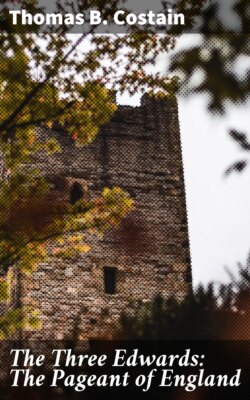Читать книгу The Three Edwards: The Pageant of England - Thomas B. Costain - Страница 48
На сайте Литреса книга снята с продажи.
3
ОглавлениеTable of Contents
Edward’s dissatisfaction with his heir had been increasing with the years. The prince had grown into a reasonable facsimile of his father, being tall and of a handsome and sometimes impressive appearance; but there the resemblance seems to have stopped. His physical strength was great, but he did not enjoy using it in martial exercises. He was not then, and never would be, a soldier. Instead he liked to employ his great muscles in manual ways. He could shoe a horse, and enjoyed doing so, and he could thatch a house. Horses, in fact, were a passion with him, and his household records are full of information about his interest in breeding them. From the Earl Warenne, the loser at Stirling Bridge, he purchased a fine stud, and from one of his sisters he secured a white greyhound of which he became very fond. These interests were commendable enough in their way and, if he had been lucky enough to have been born the son of a country gentleman of no great prominence, he might have gone through life without attracting any unfavorable notice. It was his great misfortune that he had been born a prince, and with bad appetites that developed inordinately because of the power that came into his hands.
The king strove to instill in him a love of order and a capacity for attention to administrative detail, against the day when the complexities of the justiciary and the chancellery at Westminster would demand his attention. This does not appear to have been in any degree successful. Edward II remained to the end of his days incapable of any such concentration.
The greatest of the old king’s worries was the vulgarity of his son’s tastes and the low-grade associations into which they plunged him. There is a wardrobe item, dated 1298, of a payment of two shillings to Maude Makejoy for dancing before the prince in King’s Hall at Ipswich. This is the only reference available to this particular episode, but it is not difficult to reconstruct the scene: the royal youth of fourteen, already tall and stout of limb, dressed no doubt in parti-colored hose and with the richest of materials on his back, lolling in his seat and laughing in loud approval of the sinuous twistings and stampings of Madame Maude, and calling to one of the familiars of the household to drop a suitable reward into the probably not too clean palm of the lady; with, in all probability, his tutors seated in the idle circle, grinning and slapping their spindly thighs. This seems the only explanation to account for the listing of such a minor item in the household accounts. The official who gave the money to the dancer would not expect to be paid for it by the prince and would take this method of making certain of reimbursement.
There is a record also of compensation paid to one of the court fools because he had been made the butt of some particularly painful horseplay on the part of the prince.
The king seems to have been most particularly distressed by the freedom of talk indulged in by his son. Edward was not one of the strong and silent young men. He liked to talk. In fact, he seems to have been a bit of a babbler and would speak freely of anything he had heard, even though it might be in the nature of a secret of state. Undoubtedly it reached the stage where interested parties, even the envoys of foreign states, made a point of learning the gossip of the princely household.
On the credit side of the ledger there were instances where he showed flashes of nobler impulses. He was generous and sometimes kind. It must be added, however, that such intervals were brief and could not be construed as an indication of the real character of this most frivolous of all the Plantagenets.
The members of this kingly family seem to have been subject to a rule of rotation. Henry III was the son of John, the worst of kings, and the father of the best, Edward I. The unfortunate prince with whom these brief references are concerned was an outward copy of his father but with no solidity or fineness of character. Nonetheless, he in turn was to beget the great conqueror king, Edward III. What is known of the youth and the formative years of Edward II leaves a feeling of pity for this princeling to whom dignity was burdensome and who had no inner reserves of power to draw upon when faced with the grave responsibilities of kingship. His father seems to have sensed this, for he alternated firmness with kindly understanding in his efforts to train his successor.
Perhaps Queen Eleanor was partly to blame. She was so completely the wife that she had little time left for the care of her children. Edward, it is evident, was left without much motherly attention while the devoted queen accompanied her beloved husband on his state processionals and his incessant campaigns.
